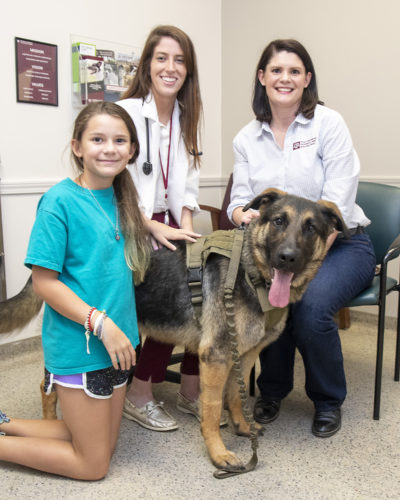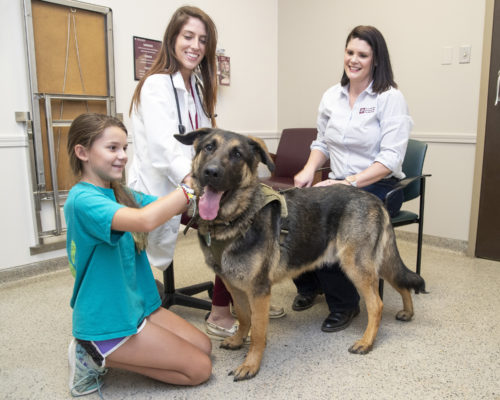Ranger’s Road to Recovery
Story by Dorian Martin

Ranger has seen a lot of change in his short life.
The 2-year-old male German Shepherd was a “hand-me-down” dog passed among Texas A&M University students who cycled through a rental property. When the final Aggie could not take Ranger with him after graduation, the all-call went out in April to find Ranger a forever home.
Fortunately, Susan Keough, who had recently lost an elderly dog, was looking for a new pet. The Texas A&M College of Veterinary Medicine & Biomedical Sciences’ (CVM) Veterinary Medical Teaching Hospital (VMTH) program manager for marketing and outreach heard about Ranger and decided to bring him into her family.
Unusually Inactive
Keough was initially surprised to find Ranger to be unusually docile and inactive for such a young German Shepherd. A few months later, Ranger’s health went into a downward spiral when the family’s young daughters left for camp.
“The day that I took them, he went into a depression. He wouldn’t eat, wouldn’t get off the couch. He was completely depressed that the girls were gone,” Keough said. “By the end of that week, he started vomiting.”
Keough took Ranger to their veterinarian, who diagnosed a gastrointestinal parasite and prescribed antibiotics. However, Ranger’s condition kept declining, even after the girls returned home.
By the time the family took the German Shepherd back to the veterinarian, Ranger was lethargic, vomiting, could not stand, and had an extremely slow heartbeat.
“The veterinarian did bloodwork and came in with a syringe of steroids and said, ‘Your dog is having a crisis. We need to stabilize him. He is dying,’” Keough recounted.
A Stress-Laden Decline
The doctor gave Ranger an injection of steroids and told the family that Ranger was in the middle of an Addisonian crisis resulting from untreated Addison’s Disease, a condition in which the adrenal gland cannot make cortisol in response to stress.
“The stressor was the girls’ leaving for camp for the week,” Keough said. “He thought his family was abandoning him again because he had been through all of this stress of people coming and going when living with these college boys.”
The family rushed Ranger to the VMTH’s Emergency Services, where he spent three days in the intensive care unit receiving medications and fluids. They also found out that the dog’s adrenal gland were not functioning appropriately.
“He will be on meds and monthly shots for the rest of his life to counter the adrenal gland that is no longer producing cortisol,” Keough said.
The Impact of Extreme Stress
Addison’s Disease is a relatively uncommon condition in dogs.
“Addison’s disease typically affects young to middle-aged female dogs; however, we can see it in any breed, sex, or age,” said Dr. Abigail Romano, a rotating veterinary intern who saw Ranger on the Internal Medicine service.
This disease can stump veterinarians and dog owners because the initial signs–lethargy or intermittent gastrointestinal signs—mimic those of other conditions. However, if Addison’s Disease progresses and is not treated, the dog can suddenly be in a health crisis due to low circulating blood volume called hypovolemic shock.
“Addisonian dogs cannot produce adequate cortisol so a lack of stress response on bloodwork raises suspicion of this disease,” Romano said, adding that dogs having an Addisonian crisis can have a low heart rate and significant changes in their blood composition.

Regaining his Vigor
Once Ranger was firmly on the road to recovery, Romano came up with a plan of action to help him remain healthy.
The first step involves daily steroid supplementation, with dosages changing in anticipation of events that may cause additional stress for Ranger, such as veterinary visits, thunderstorms, family parties, or his family leaving for an extended period of time. Additionally, dogs like Ranger who have electrolyte imbalances require monthly supplementation injected under the skin.
For the foreseeable future, Ranger will continue to have follow-up appointments with Romano.
“My role during these follow-up appointments is making sure we are managing Ranger’s disease appropriately,” the veterinarian said. “Mrs. Keough informs me of how Ranger is doing at home, including his energy level, appetite, and any reoccurrence of gastrointestinal signs such as vomiting and diarrhea. Careful monitoring is essential to make sure we are supplementing him with appropriate doses of his medications.”
These check-ups also include analyzing Ranger’s blood chemistry to ensure that electrolyte levels are within the normal range.
Maintaining a Careful Watch
For the near future, Keough will have to keep a close eye on Ranger since he will remain at risk of having another Addisonian crisis.
Keeping his condition in check requires maintaining a fine balance. Signs of lethargy, weakness, vomiting, and diarrhea help the veterinarians know if they are providing the proper dosage of supplements. In addition, increased panting, appetite, drinking and urination may suggest that Ranger is receiving too strong a dosage of steroids.
Eventually, Ranger will need fewer checkups and Keough will learn to give Ranger’s injections. The good news is that with proper management, Ranger has an excellent prognosis and is expected to live a normal life.
Ranger’s illness also gave Keough firsthand experience of what it is like to be a client at her workplace—and the compassionate care that each animal receives.
“I understand where our doctors, our residents, and our fourth-year students are coming from, and, now, being on the other side of the fence, I can see where the client comes from,” Keough said. “One of my worries was that when Ranger was in the ICU and hooked up to the IV all day for three days, that he wasn’t being loved on. But, no, they were back there loving on him and making sure that he was taken care of. That made me feel better.”
###
For more information about the Texas A&M College of Veterinary Medicine & Biomedical Sciences, please visit our website at vetmed.tamu.edu or join us on Facebook, Instagram, and Twitter.
Contact Information: Jennifer Gauntt, Interim Director of CVM Communications, Texas A&M College of Veterinary Medicine & Biomedical Science; jgauntt@cvm.tamu.edu; 979-862-4216


